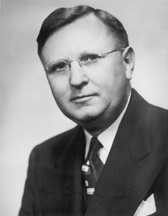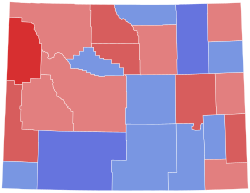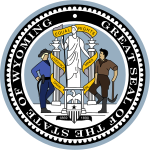
Alonzo Monroe Clark was an American politician who was the 16th Governor of Wyoming from 1931 to 1933.

The 2010 Wyoming gubernatorial election was held on Tuesday, November 2, 2010 to elect the Governor of Wyoming. Party primaries were held on August 17.

The 1960 United States Senate election in Wyoming was held on November 8, 1960. Incumbent Democratic Senator Joseph C. O'Mahoney was first appointed to the U.S. Senate from Wyoming's Class 1 Senate seat in 1934, and was re-elected in 1934, 1940, and 1946 before losing re-election in 1952. He was then elected to the Class 2 Senate seat in 1954. O'Mahoney, in failing health and increasingly limited in his mobility, declined to run for a fifth non-consecutive term in the Senate. The winner of this election, Keith Thomson, died before assuming his elected office.

The 1958 United States Senate election in Wyoming took place November 4, 1958. Incumbent Republican Senator Frank A. Barrett ran for re-election to his second term. He was challenged by Gale W. McGee, a University of Wyoming professor and the Democratic nominee. Despite the state's strong Republican lean, McGee ran an energetic campaign against Barrett, earning the support of the national Democratic establishment. McGee ultimately narrowly upset Barrett, winning 51% of the vote to Barrett's 49%.

The 1950 Wyoming gubernatorial election took place on November 7, 1950. Incumbent Republican Governor Arthur G. Crane, who ascended to the governorship when Lester C. Hunt was elected to the Senate in 1948, declined to seek re-election. Congressman Frank A. Barrett won the Republican primary to succeed Crane and faced former State Auditor John J. McIntyre, the Democratic nominee, in the general election. Helped by the strong performance nationwide of the Republican Party, Barrett defeated McIntyre by a wide margin.

The 1926 Wyoming gubernatorial election took place on November 3, 1926. Incumbent Democratic Governor Nellie Tayloe Ross, first elected in the 1924 special election, ran for re-election to a second term. She was narrowly defeated by the Republican nominee, former State Engineer Frank Emerson.

The 1932 Wyoming gubernatorial special election took place on November 8, 1932. Just several weeks into his second term, Republican governor Frank Emerson died in office. Secretary of State Alonzo M. Clark ascended to the governorship, and a special election was called for 1934. Clark ran for re-election, but was defeated in the Republican primary by State Treasurer Harry R. Weston. Meanwhile, former state senator Leslie A. Miller, the unsuccessful Democratic nominee against Emerson in 1930, once again ran for the office and won the Democratic primary. In the general election, another close election ensued. But Miller, likely aided by Franklin D. Roosevelt's strong performance in Wyoming in that year's presidential election, narrowly defeated Weston to win his first term as governor.

The 1934 Wyoming gubernatorial election took place on November 6, 1934. Incumbent Democratic Governor Leslie A. Miller ran for re-election to his second term, and his first full term, following his initial election in the 1932 special election. Miller faced Republican Alonzo M. Clark, his predecessor as governor, in the general election. Despite the closeness of Miller's first election, he took advantage of the nationwide Democratic landslide and easily defeated Clark.

The 1938 Wyoming gubernatorial election took place on November 8, 1938. Incumbent Democratic Governor Leslie A. Miller ran for re-election to his third term, and his second full term. Nels H. Smith, a former State Representative and former state highway commissioner, won a crowded Republican primary and advanced to the general election against Miller. Though Miller won his re-election campaign four years earlier in a landslide, Smith was able to take advantage of the nationwide Republican wave to defeat him in a landslide, winning 60% of the vote to Governor Miller's 40%.

A general election was held in the U.S. state of Wyoming on Tuesday, November 2, 2010. All of the state's executive officers—the Governor, Secretary of State, Auditor, Treasurer, and Superintendent of Public Instruction—were up for election.

The 1934 United States Senate elections in Wyoming took place on November 6, 1934. Incumbent Democratic Senator John B. Kendrick died on November 3, 1933, and Joseph C. O'Mahoney was appointed by Governor Leslie A. Miller as Kendrick's replacement. Two elections for the same Senate seat were held on the same day; one as a special election to fill the remainder of Kendrick's original six-year term, and another to select a Senator to serve the next six-year term. O'Mahoney ran for re-election in both elections. He was opposed by Republican Congressman Vincent Carter. Aided by the strong performance by the Democratic Party throughout the country in 1934, and by Governor Miller's landslide re-election, O'Mahoney handily defeated Carter to win re-election.

A general election was held in the U.S. state of Wyoming on Tuesday, November 2, 1926. All of the state's executive officers—the Governor, Secretary of State, Auditor, Treasurer, and Superintendent of Public Instruction—were up for election. Republicans narrowly picked up the governorship and solidified their control on the other statewide offices, increasing their margin of victory in each race.

A general election was held in the U.S. state of Wyoming on Tuesday, November 4, 1930. All of the state's executive officers—the Governor, Secretary of State, Auditor, Treasurer, and Superintendent of Public Instruction—were up for election. Republicans narrowly held onto the Governor's office and won every other state office.

A general election was held in the U.S. state of Wyoming on Tuesday, November 6, 1934. All of the state's executive officers—the Governor, Secretary of State, Auditor, Treasurer, and Superintendent of Public Instruction—were up for election. In the 1932 gubernatorial special election, the Democratic candidate, Leslie A. Miller, won and ran for re-election for a full term in 1934. The Democratic Party also won elections for Secretary of State, Auditor, Treasurer, and Superintendent of Public Instruction, flipping those offices from the Republican Party.

A general election was held in the U.S. state of Wyoming on Tuesday, November 3, 1942. All of the state's executive officers—the governor, secretary of state, auditor, treasurer, and superintendent of public instruction—were up for election. Like the 1938 elections, this year's elections were something of a mixed bag for both parties. Democratic secretary of state Lester C. Hunt successfully defeated Republican governor Nels H. Smith for re-election, but Republicans flipped the secretary of state's office in Hunt's absence. The other incumbents—State Auditor William M. Jack, a Democrat, and Superintendent Esther L. Anderson, a Republican—were re-elected, and Republicans held onto the state treasurer's office.

A general election was held in the U.S. state of Wyoming on Tuesday, November 7, 1950. All of the state's executive officers—the governor, secretary of state, auditor, treasurer, and superintendent of public instruction—were up for election. The Republican Party swept all of the offices. Following Democratic governor Lester C. Hunt's election to the U.S. Senate in 1948, Republican secretary of state Arthur G. Crane had been acting as governor. Republican Congressman Frank A. Barrett was elected governor, and Republican candidates won the other statewide races.

A general election was held in the U.S. state of Wyoming on Tuesday, November 7, 1962. All of the state's executive officers—the Governor, Secretary of State, Auditor, Treasurer, and Superintendent of Public Instruction—were up for election. Republicans ran the table on the state's executive offices, defeating incumbent Governor Jack R. Gage and incumbent Superintendent Velma Linford and picking up the Secretary of State's office. Republican State Auditor Minnie A. Mitchell was re-elected and Republicans also held the Treasurer's office.

A general election was held in the U.S. state of Wyoming on Tuesday, November 7, 1922. All of the state's executive officers—the Governor, Secretary of State, Auditor, Treasurer, and Superintendent of Public Instruction—were up for election. Democrats improved considerably from their performances in 1918, with William B. Ross winning the gubernatorial election and almost all of their statewide candidates outpacing their 1918 nominees. However, Republicans held all of the other statewide offices.

A general election was held in the U.S. state of Wyoming on Tuesday, November 3, 1914. All of the state's executive officers—the Governor, Secretary of State, Auditor, Treasurer, and Superintendent of Public Instruction—were up for election. Governor Joseph M. Carey declined to seek re-election to a second term, and Democratic State Senator John B. Kendrick was elected as his successor. Republicans, however, won all of the other statewide executive offices, including picking up the Superintendent's office.

A general election was held in the U.S. state of Wyoming on Tuesday, November 5, 1918. All of the state's executive officers—the Governor, Secretary of State, Auditor, Treasurer, and Superintendent of Public Instruction—were up for election. Republicans won all statewide offices by wide margins, and with Robert D. Carey's defeat of Frank L. Houx, picked up the governorship following two consecutive losses to Democrats.









